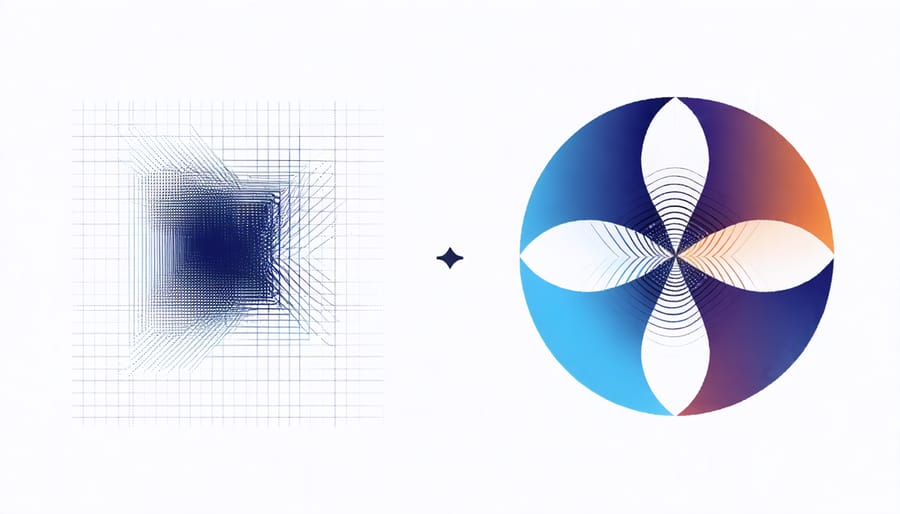Quantum computing harnesses the extraordinary power of quantum mechanics to solve complex problems that traditional computers can’t handle. As one of the most significant technological breakthroughs revolutionizing medical technology, it uses quantum bits (qubits) instead of traditional binary digits. Unlike regular computers that process information sequentially, quantum computers leverage phenomena like superposition and entanglement to perform multiple calculations simultaneously, making them exponentially more powerful for certain tasks.
Think of it as the difference between checking every possible solution one at a time versus exploring all possibilities at once. This breakthrough technology promises to transform healthcare by accelerating drug discovery, optimizing treatment plans, and unlocking new possibilities in medical research. For Albertans concerned about health innovation, quantum computing represents a future where complex medical challenges can be solved in hours instead of years, potentially leading to more effective, personalized treatments for chronic conditions.
What Makes Quantum Computing Different?
The Building Blocks: Qubits vs Traditional Bits
Think of traditional computer bits like simple light switches – they can only be either on (1) or off (0). Now, quantum computing introduces qubits, which are like magical switches that can be on, off, or somehow both at the same time. This unique property is called superposition, and it’s what makes quantum computers potentially much more powerful than regular computers.
To put it in everyday terms, imagine you’re trying to find your way through a maze. A traditional computer would check each path one at a time, like walking through with a flashlight. A quantum computer, using qubits, can explore multiple paths simultaneously, as if you could split into many versions of yourself to check different routes at once.
This ability to process multiple possibilities simultaneously is particularly exciting for healthcare applications, like analyzing complex molecular structures for new medications. Where a traditional computer might take years to simulate all possible drug interactions, a quantum computer could potentially do it in hours or days, potentially leading to faster drug discovery and more personalized treatments.

Superposition and Entanglement Made Simple
Think of superposition as being in multiple places at once – like having the ability to check every aisle in a pharmacy simultaneously for the medicine you need. In quantum computing, bits can exist in multiple states at the same time, rather than just being 1 or 0 like in regular computers. This allows quantum computers to process vast amounts of information much faster than traditional computers.
Entanglement is equally fascinating but simpler to understand than you might think. Imagine two dancers who perfectly mirror each other’s movements, no matter how far apart they are. In quantum computing, particles become “entangled” in a similar way – when you measure one particle, you instantly know the state of its partner, even if they’re separated by great distances.
These properties are what make quantum computers so powerful for healthcare applications. When scientists need to analyze millions of potential drug combinations or simulate complex molecular interactions, quantum computers can process all these possibilities simultaneously, dramatically speeding up the discovery of new treatments and medicines that could benefit our community.
Why Drug Discovery Needs Quantum Computing
The Complex World of Molecular Interactions
When scientists develop new medications, they need to understand how different molecules interact with each other. These interactions happen at an incredibly tiny scale where quantum mechanics rules apply. Traditional computers struggle to simulate these complex molecular behaviors accurately, which can slow down the development of life-saving drugs.
This is where quantum computers shine. They can naturally model molecular interactions because they operate using the same quantum principles that govern these tiny particles. Think of it like trying to understand how a recipe works – instead of reading about it in a book (traditional computing), quantum computers can actually “cook” with the same ingredients (quantum particles).
For example, when developing a new drug for diabetes or heart disease, scientists need to know exactly how potential medications will bind to specific proteins in your body. Quantum computers can simulate these interactions more accurately and quickly than conventional computers, potentially reducing the time it takes to develop new treatments from years to months.
These molecular simulations are particularly important for understanding complex diseases and creating more effective, personalized treatments. By better understanding how molecules interact, researchers can design medications that work more effectively while causing fewer side effects – something that could benefit many Albertans managing chronic conditions.

Faster, More Accurate Drug Testing
Quantum computing is revolutionizing how we develop and test new medications, making the process faster and more accurate than ever before. Traditional computers can take years to simulate how drug molecules interact with human cells and proteins, but quantum computers can perform these complex calculations in mere hours or days.
This dramatic improvement in speed means pharmaceutical companies can test thousands of potential drug compounds simultaneously, significantly reducing the time it takes to bring life-saving medications to market. For example, during the COVID-19 pandemic, researchers used quantum simulations to screen possible drug candidates much more quickly than conventional methods would allow.
The increased accuracy of quantum simulations also helps predict how drugs will behave in the human body more reliably. This means fewer failed clinical trials and reduced risk of unexpected side effects, ultimately making drug development safer and more cost-effective.
For patients, these advances translate to faster access to new treatments, more personalized medication options, and potentially lower drug costs. Local healthcare providers and research facilities in Alberta are already preparing to incorporate quantum computing technologies into their drug development processes, positioning our community at the forefront of this medical revolution.
As quantum computers become more powerful and accessible, we can expect to see even more breakthroughs in drug discovery, particularly for complex conditions like cancer, Alzheimer’s disease, and rare genetic disorders.
Real-World Impact on Healthcare
Personalized Medicine Possibilities
Quantum computing is revolutionizing how we approach healthcare by enabling truly personalized healthcare solutions that weren’t possible before. By processing vast amounts of genetic and medical data simultaneously, quantum computers can help doctors create treatment plans tailored to your unique genetic makeup.
Think of it like having a million health specialists working together instantly to find the perfect treatment for you. These powerful computers can analyze how different medications might interact with your specific genetic code, helping to predict which treatments will work best while minimizing side effects.
For Albertans managing chronic conditions like diabetes or heart disease, this technology could mean more effective treatments with fewer trial-and-error approaches. Quantum computers can simulate how different medications interact with proteins in your body, leading to more precise dosing and better outcomes.
The real game-changer is in preventive care. By analyzing patterns across genetic data, lifestyle factors, and environmental influences, quantum computers can help identify health risks before they become problems. This means you and your healthcare provider can take proactive steps to prevent illness rather than just treating symptoms.
While this technology is still developing, it’s already showing promise in creating more effective, personalized treatment approaches that could transform healthcare as we know it. The future of medicine is becoming increasingly precise, efficient, and tailored to each individual’s needs.

Bringing New Drugs to Market Sooner
In the quest to develop new medications, time is truly of the essence. Traditional drug development can take up to 15 years and cost billions of dollars, but quantum computing is revolutionizing this process. As one of the most promising modern healthcare technologies, quantum computers can simulate molecular interactions in hours rather than years, significantly accelerating drug discovery.
This dramatic improvement in timeline means potential life-saving medications could reach Albertans much sooner. Where conventional computers might take months to analyze a single molecule’s behavior, quantum computers can examine thousands of potential drug compounds simultaneously. This capability not only speeds up the process but also reduces development costs by up to 25%.
The financial impact is substantial – pharmaceutical companies typically spend between $1-2 billion to bring a new drug to market. By leveraging quantum computing, these costs could potentially drop to $750 million or less. These savings could translate into more affordable medications for our community and increased investment in researching treatments for rare diseases.
For patients waiting for new treatments, particularly those with chronic conditions, this acceleration in drug development offers hope. Rather than waiting decades for new therapeutic options, breakthrough treatments could become available within a few years of initial research, making a real difference in people’s lives right here in Alberta.
As we look to the future of healthcare in Alberta and beyond, quantum computing stands as a transformative force that promises to revolutionize how we approach medicine and patient care. This powerful technology isn’t just about faster computers – it represents a fundamental shift in how we can tackle complex health challenges that were previously unsolvable.
By harnessing the unique properties of quantum mechanics, researchers and healthcare providers will be able to develop more effective treatments, personalized medicine approaches, and breakthrough drugs in a fraction of the time it takes today. For our community, this means potentially faster access to life-saving medications and more targeted treatments for chronic conditions.
The impact of quantum computing in healthcare will be particularly significant in areas like drug discovery, where complex molecular interactions can be simulated with unprecedented accuracy. This could lead to more effective treatments for conditions that affect many Albertans, from diabetes to heart disease.
While quantum computing may seem like a distant concept, its practical applications are already beginning to emerge in our healthcare system. As this technology continues to develop, it will become an increasingly important tool in improving health outcomes and quality of life for patients across our province.
The future of healthcare is quantum-powered, and staying informed about these advances helps us all make better decisions about our health and wellness. Together, we can look forward to a healthcare system that’s more efficient, personalized, and effective than ever before.

